ACC220 Law of Associations: Seedy Vineyards Contract Case
VerifiedAdded on 2023/06/07
|8
|2498
|393
Case Study
AI Summary
This assignment provides a legal analysis of two distinct scenarios involving Organic Wines Pty Ltd (OW). The first scenario examines whether OW is bound by a supply contract with Seedy Vineyards, considering OW's constitution restricts it to organic farming and Seedy's use of pesticides. It applies the indoor management rule and sections 128 and 129 of the Corporations Act, 2001, to determine the contract's enforceability. The analysis concludes that the contract is not enforceable against OW due to Seedy's awareness of Priya's exceeded authority and the breach of OW's objects clause. The second scenario assesses whether Ted can enforce a clause in OW's constitution appointing him as company solicitor, referencing the Eley v Positive Government Security Life Assurance Co Ltd case. It concludes that Ted's action is unlikely to succeed as the constitution can only be enforced by members in their capacity as members. Question 2 advises Olive on potential breaches of directors' duties by Karim and Miles under the Corporations Act, particularly section 181 regarding acting in good faith and section 182 and 183 regarding using their positions and information improperly, in relation to share transfers and purchasing shares without disclosing improved company prospects.
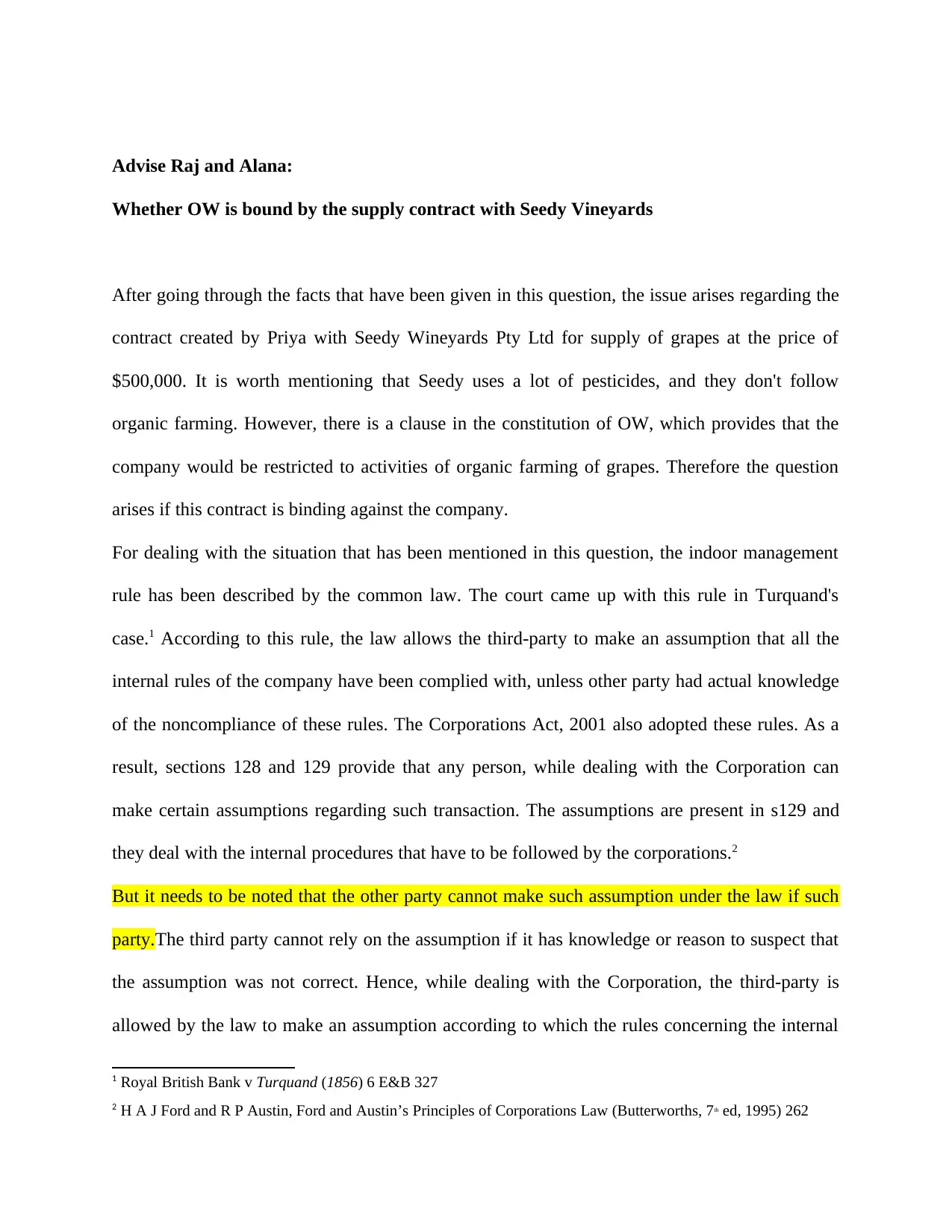
Advise Raj and Alana:
Whether OW is bound by the supply contract with Seedy Vineyards
After going through the facts that have been given in this question, the issue arises regarding the
contract created by Priya with Seedy Wineyards Pty Ltd for supply of grapes at the price of
$500,000. It is worth mentioning that Seedy uses a lot of pesticides, and they don't follow
organic farming. However, there is a clause in the constitution of OW, which provides that the
company would be restricted to activities of organic farming of grapes. Therefore the question
arises if this contract is binding against the company.
For dealing with the situation that has been mentioned in this question, the indoor management
rule has been described by the common law. The court came up with this rule in Turquand's
case.1 According to this rule, the law allows the third-party to make an assumption that all the
internal rules of the company have been complied with, unless other party had actual knowledge
of the noncompliance of these rules. The Corporations Act, 2001 also adopted these rules. As a
result, sections 128 and 129 provide that any person, while dealing with the Corporation can
make certain assumptions regarding such transaction. The assumptions are present in s129 and
they deal with the internal procedures that have to be followed by the corporations.2
But it needs to be noted that the other party cannot make such assumption under the law if such
party.The third party cannot rely on the assumption if it has knowledge or reason to suspect that
the assumption was not correct. Hence, while dealing with the Corporation, the third-party is
allowed by the law to make an assumption according to which the rules concerning the internal
1 Royal British Bank v Turquand (1856) 6 E&B 327
2 H A J Ford and R P Austin, Ford and Austin’s Principles of Corporations Law (Butterworths, 7th ed, 1995) 262
Whether OW is bound by the supply contract with Seedy Vineyards
After going through the facts that have been given in this question, the issue arises regarding the
contract created by Priya with Seedy Wineyards Pty Ltd for supply of grapes at the price of
$500,000. It is worth mentioning that Seedy uses a lot of pesticides, and they don't follow
organic farming. However, there is a clause in the constitution of OW, which provides that the
company would be restricted to activities of organic farming of grapes. Therefore the question
arises if this contract is binding against the company.
For dealing with the situation that has been mentioned in this question, the indoor management
rule has been described by the common law. The court came up with this rule in Turquand's
case.1 According to this rule, the law allows the third-party to make an assumption that all the
internal rules of the company have been complied with, unless other party had actual knowledge
of the noncompliance of these rules. The Corporations Act, 2001 also adopted these rules. As a
result, sections 128 and 129 provide that any person, while dealing with the Corporation can
make certain assumptions regarding such transaction. The assumptions are present in s129 and
they deal with the internal procedures that have to be followed by the corporations.2
But it needs to be noted that the other party cannot make such assumption under the law if such
party.The third party cannot rely on the assumption if it has knowledge or reason to suspect that
the assumption was not correct. Hence, while dealing with the Corporation, the third-party is
allowed by the law to make an assumption according to which the rules concerning the internal
1 Royal British Bank v Turquand (1856) 6 E&B 327
2 H A J Ford and R P Austin, Ford and Austin’s Principles of Corporations Law (Butterworths, 7th ed, 1995) 262
Paraphrase This Document
Need a fresh take? Get an instant paraphrase of this document with our AI Paraphraser
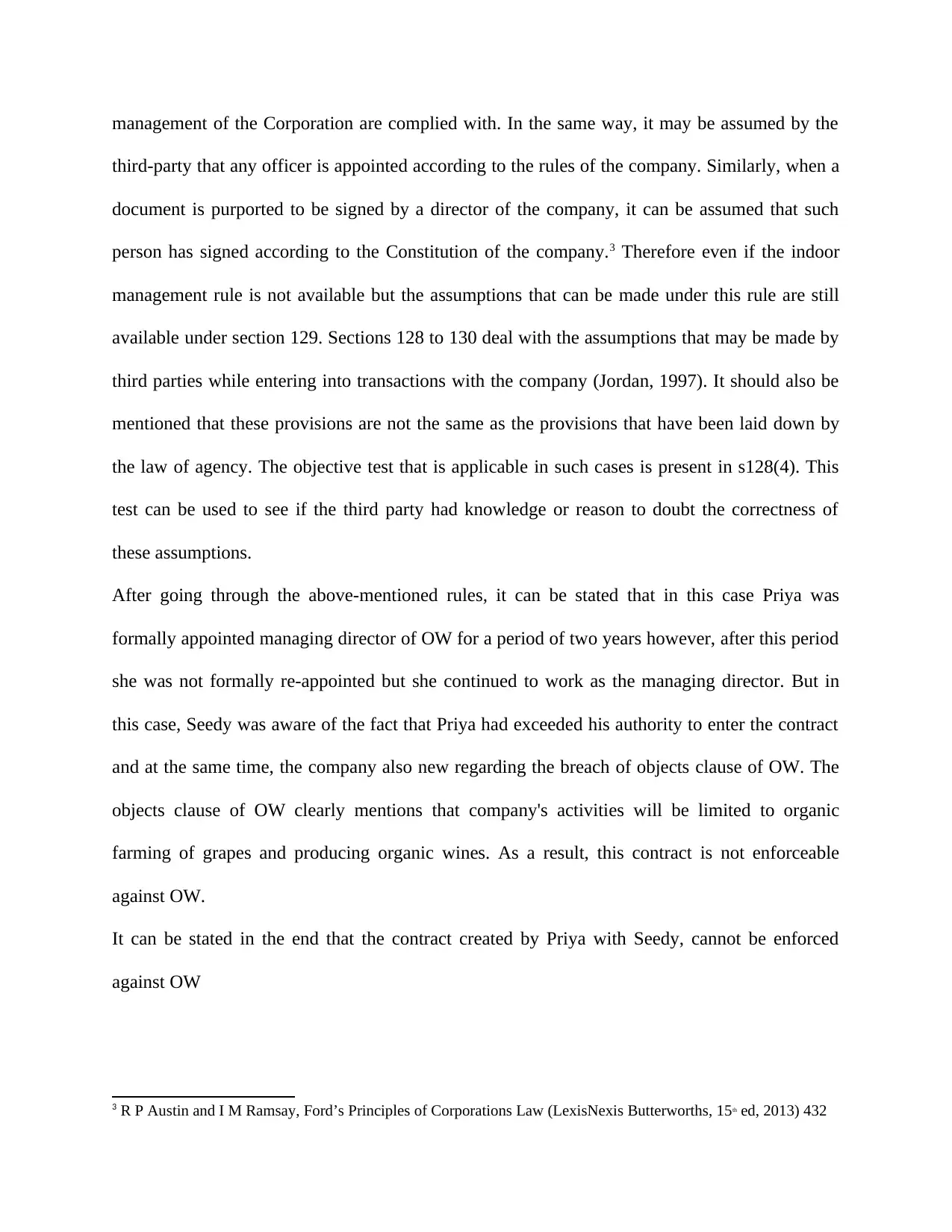
management of the Corporation are complied with. In the same way, it may be assumed by the
third-party that any officer is appointed according to the rules of the company. Similarly, when a
document is purported to be signed by a director of the company, it can be assumed that such
person has signed according to the Constitution of the company.3 Therefore even if the indoor
management rule is not available but the assumptions that can be made under this rule are still
available under section 129. Sections 128 to 130 deal with the assumptions that may be made by
third parties while entering into transactions with the company (Jordan, 1997). It should also be
mentioned that these provisions are not the same as the provisions that have been laid down by
the law of agency. The objective test that is applicable in such cases is present in s128(4). This
test can be used to see if the third party had knowledge or reason to doubt the correctness of
these assumptions.
After going through the above-mentioned rules, it can be stated that in this case Priya was
formally appointed managing director of OW for a period of two years however, after this period
she was not formally re-appointed but she continued to work as the managing director. But in
this case, Seedy was aware of the fact that Priya had exceeded his authority to enter the contract
and at the same time, the company also new regarding the breach of objects clause of OW. The
objects clause of OW clearly mentions that company's activities will be limited to organic
farming of grapes and producing organic wines. As a result, this contract is not enforceable
against OW.
It can be stated in the end that the contract created by Priya with Seedy, cannot be enforced
against OW
3 R P Austin and I M Ramsay, Ford’s Principles of Corporations Law (LexisNexis Butterworths, 15th ed, 2013) 432
third-party that any officer is appointed according to the rules of the company. Similarly, when a
document is purported to be signed by a director of the company, it can be assumed that such
person has signed according to the Constitution of the company.3 Therefore even if the indoor
management rule is not available but the assumptions that can be made under this rule are still
available under section 129. Sections 128 to 130 deal with the assumptions that may be made by
third parties while entering into transactions with the company (Jordan, 1997). It should also be
mentioned that these provisions are not the same as the provisions that have been laid down by
the law of agency. The objective test that is applicable in such cases is present in s128(4). This
test can be used to see if the third party had knowledge or reason to doubt the correctness of
these assumptions.
After going through the above-mentioned rules, it can be stated that in this case Priya was
formally appointed managing director of OW for a period of two years however, after this period
she was not formally re-appointed but she continued to work as the managing director. But in
this case, Seedy was aware of the fact that Priya had exceeded his authority to enter the contract
and at the same time, the company also new regarding the breach of objects clause of OW. The
objects clause of OW clearly mentions that company's activities will be limited to organic
farming of grapes and producing organic wines. As a result, this contract is not enforceable
against OW.
It can be stated in the end that the contract created by Priya with Seedy, cannot be enforced
against OW
3 R P Austin and I M Ramsay, Ford’s Principles of Corporations Law (LexisNexis Butterworths, 15th ed, 2013) 432
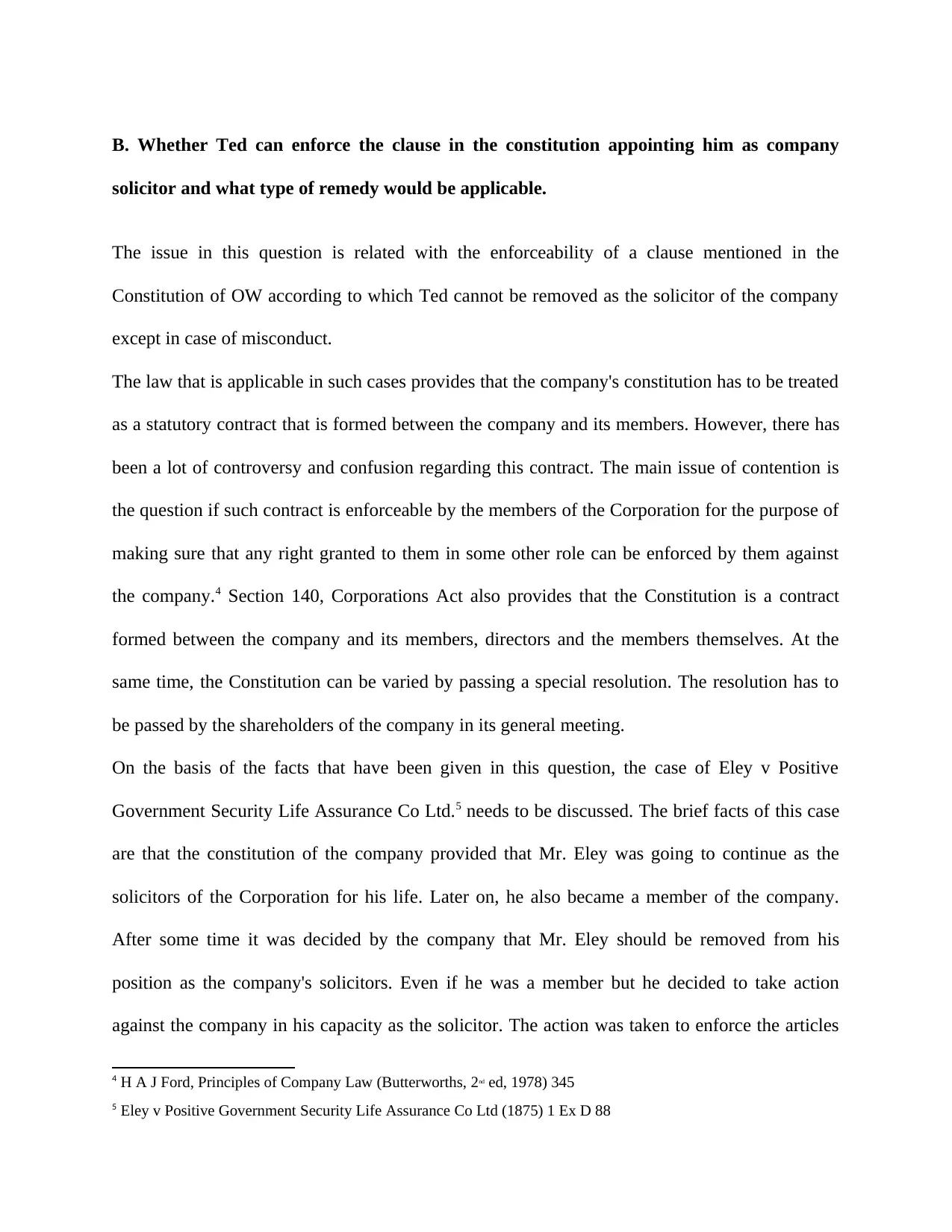
B. Whether Ted can enforce the clause in the constitution appointing him as company
solicitor and what type of remedy would be applicable.
The issue in this question is related with the enforceability of a clause mentioned in the
Constitution of OW according to which Ted cannot be removed as the solicitor of the company
except in case of misconduct.
The law that is applicable in such cases provides that the company's constitution has to be treated
as a statutory contract that is formed between the company and its members. However, there has
been a lot of controversy and confusion regarding this contract. The main issue of contention is
the question if such contract is enforceable by the members of the Corporation for the purpose of
making sure that any right granted to them in some other role can be enforced by them against
the company.4 Section 140, Corporations Act also provides that the Constitution is a contract
formed between the company and its members, directors and the members themselves. At the
same time, the Constitution can be varied by passing a special resolution. The resolution has to
be passed by the shareholders of the company in its general meeting.
On the basis of the facts that have been given in this question, the case of Eley v Positive
Government Security Life Assurance Co Ltd.5 needs to be discussed. The brief facts of this case
are that the constitution of the company provided that Mr. Eley was going to continue as the
solicitors of the Corporation for his life. Later on, he also became a member of the company.
After some time it was decided by the company that Mr. Eley should be removed from his
position as the company's solicitors. Even if he was a member but he decided to take action
against the company in his capacity as the solicitor. The action was taken to enforce the articles
4 H A J Ford, Principles of Company Law (Butterworths, 2nd ed, 1978) 345
5 Eley v Positive Government Security Life Assurance Co Ltd (1875) 1 Ex D 88
solicitor and what type of remedy would be applicable.
The issue in this question is related with the enforceability of a clause mentioned in the
Constitution of OW according to which Ted cannot be removed as the solicitor of the company
except in case of misconduct.
The law that is applicable in such cases provides that the company's constitution has to be treated
as a statutory contract that is formed between the company and its members. However, there has
been a lot of controversy and confusion regarding this contract. The main issue of contention is
the question if such contract is enforceable by the members of the Corporation for the purpose of
making sure that any right granted to them in some other role can be enforced by them against
the company.4 Section 140, Corporations Act also provides that the Constitution is a contract
formed between the company and its members, directors and the members themselves. At the
same time, the Constitution can be varied by passing a special resolution. The resolution has to
be passed by the shareholders of the company in its general meeting.
On the basis of the facts that have been given in this question, the case of Eley v Positive
Government Security Life Assurance Co Ltd.5 needs to be discussed. The brief facts of this case
are that the constitution of the company provided that Mr. Eley was going to continue as the
solicitors of the Corporation for his life. Later on, he also became a member of the company.
After some time it was decided by the company that Mr. Eley should be removed from his
position as the company's solicitors. Even if he was a member but he decided to take action
against the company in his capacity as the solicitor. The action was taken to enforce the articles
4 H A J Ford, Principles of Company Law (Butterworths, 2nd ed, 1978) 345
5 Eley v Positive Government Security Life Assurance Co Ltd (1875) 1 Ex D 88
⊘ This is a preview!⊘
Do you want full access?
Subscribe today to unlock all pages.

Trusted by 1+ million students worldwide
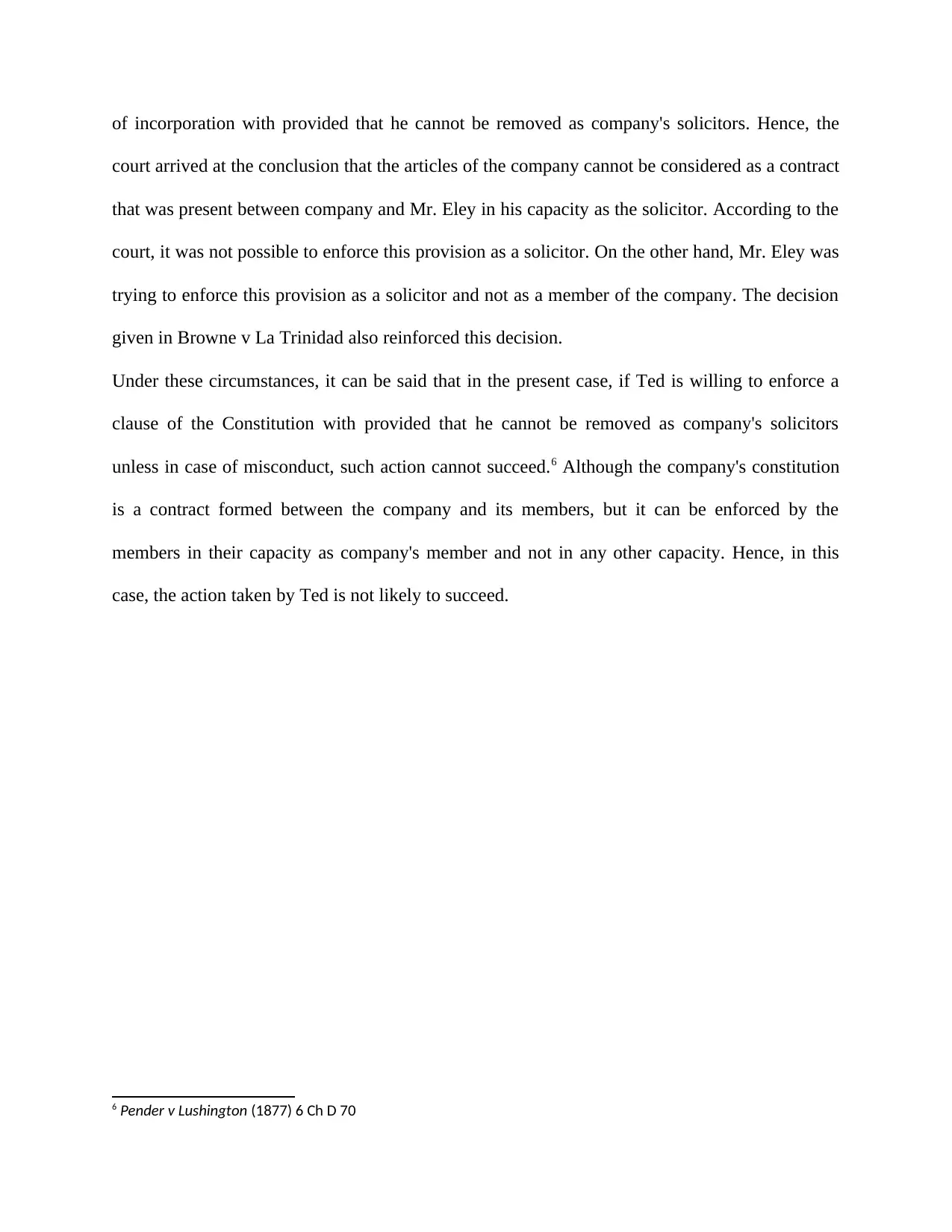
of incorporation with provided that he cannot be removed as company's solicitors. Hence, the
court arrived at the conclusion that the articles of the company cannot be considered as a contract
that was present between company and Mr. Eley in his capacity as the solicitor. According to the
court, it was not possible to enforce this provision as a solicitor. On the other hand, Mr. Eley was
trying to enforce this provision as a solicitor and not as a member of the company. The decision
given in Browne v La Trinidad also reinforced this decision.
Under these circumstances, it can be said that in the present case, if Ted is willing to enforce a
clause of the Constitution with provided that he cannot be removed as company's solicitors
unless in case of misconduct, such action cannot succeed.6 Although the company's constitution
is a contract formed between the company and its members, but it can be enforced by the
members in their capacity as company's member and not in any other capacity. Hence, in this
case, the action taken by Ted is not likely to succeed.
6 Pender v Lushington (1877) 6 Ch D 70
court arrived at the conclusion that the articles of the company cannot be considered as a contract
that was present between company and Mr. Eley in his capacity as the solicitor. According to the
court, it was not possible to enforce this provision as a solicitor. On the other hand, Mr. Eley was
trying to enforce this provision as a solicitor and not as a member of the company. The decision
given in Browne v La Trinidad also reinforced this decision.
Under these circumstances, it can be said that in the present case, if Ted is willing to enforce a
clause of the Constitution with provided that he cannot be removed as company's solicitors
unless in case of misconduct, such action cannot succeed.6 Although the company's constitution
is a contract formed between the company and its members, but it can be enforced by the
members in their capacity as company's member and not in any other capacity. Hence, in this
case, the action taken by Ted is not likely to succeed.
6 Pender v Lushington (1877) 6 Ch D 70
Paraphrase This Document
Need a fresh take? Get an instant paraphrase of this document with our AI Paraphraser
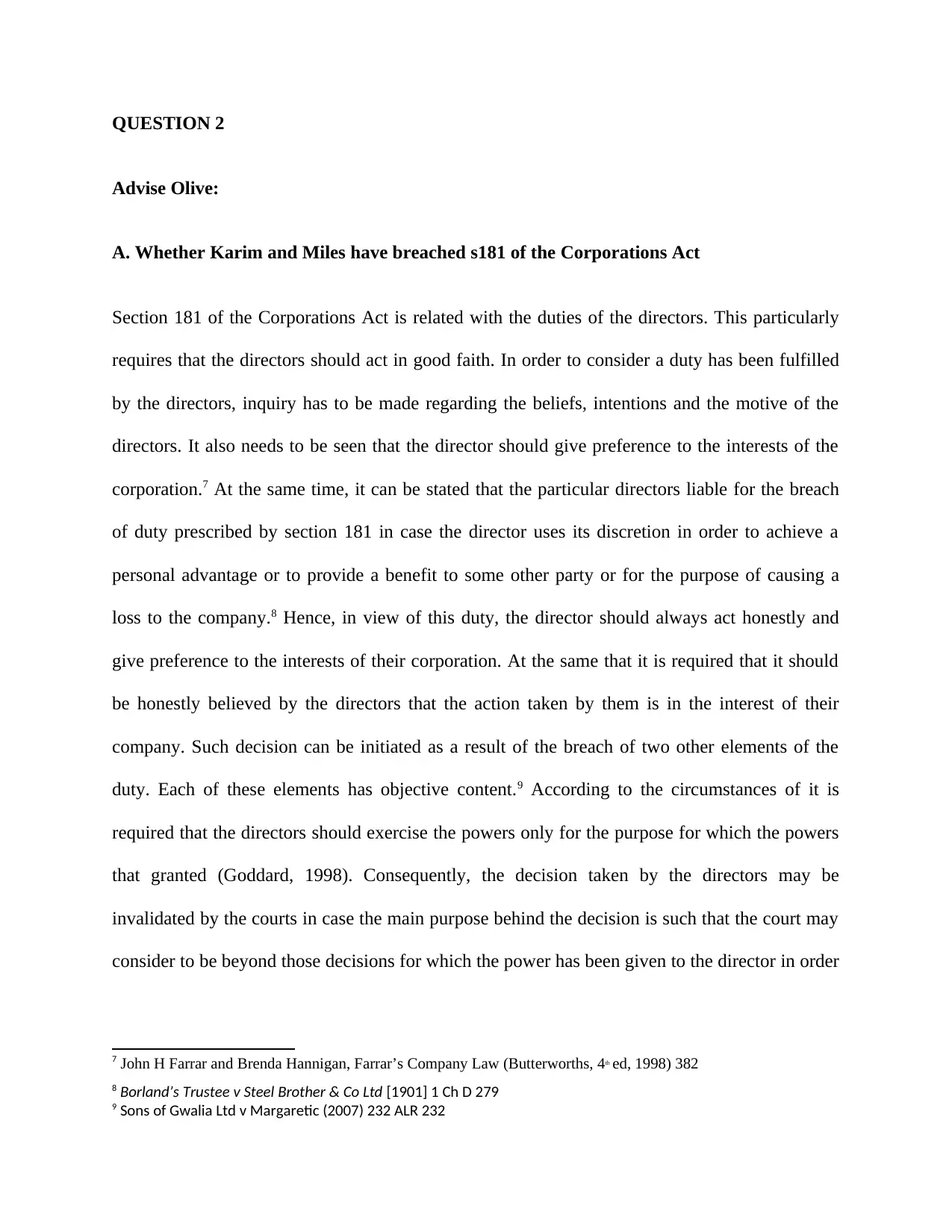
QUESTION 2
Advise Olive:
A. Whether Karim and Miles have breached s181 of the Corporations Act
Section 181 of the Corporations Act is related with the duties of the directors. This particularly
requires that the directors should act in good faith. In order to consider a duty has been fulfilled
by the directors, inquiry has to be made regarding the beliefs, intentions and the motive of the
directors. It also needs to be seen that the director should give preference to the interests of the
corporation.7 At the same time, it can be stated that the particular directors liable for the breach
of duty prescribed by section 181 in case the director uses its discretion in order to achieve a
personal advantage or to provide a benefit to some other party or for the purpose of causing a
loss to the company.8 Hence, in view of this duty, the director should always act honestly and
give preference to the interests of their corporation. At the same that it is required that it should
be honestly believed by the directors that the action taken by them is in the interest of their
company. Such decision can be initiated as a result of the breach of two other elements of the
duty. Each of these elements has objective content.9 According to the circumstances of it is
required that the directors should exercise the powers only for the purpose for which the powers
that granted (Goddard, 1998). Consequently, the decision taken by the directors may be
invalidated by the courts in case the main purpose behind the decision is such that the court may
consider to be beyond those decisions for which the power has been given to the director in order
7 John H Farrar and Brenda Hannigan, Farrar’s Company Law (Butterworths, 4th ed, 1998) 382
8 Borland’s Trustee v Steel Brother & Co Ltd [1901] 1 Ch D 279
9 Sons of Gwalia Ltd v Margaretic (2007) 232 ALR 232
Advise Olive:
A. Whether Karim and Miles have breached s181 of the Corporations Act
Section 181 of the Corporations Act is related with the duties of the directors. This particularly
requires that the directors should act in good faith. In order to consider a duty has been fulfilled
by the directors, inquiry has to be made regarding the beliefs, intentions and the motive of the
directors. It also needs to be seen that the director should give preference to the interests of the
corporation.7 At the same time, it can be stated that the particular directors liable for the breach
of duty prescribed by section 181 in case the director uses its discretion in order to achieve a
personal advantage or to provide a benefit to some other party or for the purpose of causing a
loss to the company.8 Hence, in view of this duty, the director should always act honestly and
give preference to the interests of their corporation. At the same that it is required that it should
be honestly believed by the directors that the action taken by them is in the interest of their
company. Such decision can be initiated as a result of the breach of two other elements of the
duty. Each of these elements has objective content.9 According to the circumstances of it is
required that the directors should exercise the powers only for the purpose for which the powers
that granted (Goddard, 1998). Consequently, the decision taken by the directors may be
invalidated by the courts in case the main purpose behind the decision is such that the court may
consider to be beyond those decisions for which the power has been given to the director in order
7 John H Farrar and Brenda Hannigan, Farrar’s Company Law (Butterworths, 4th ed, 1998) 382
8 Borland’s Trustee v Steel Brother & Co Ltd [1901] 1 Ch D 279
9 Sons of Gwalia Ltd v Margaretic (2007) 232 ALR 232
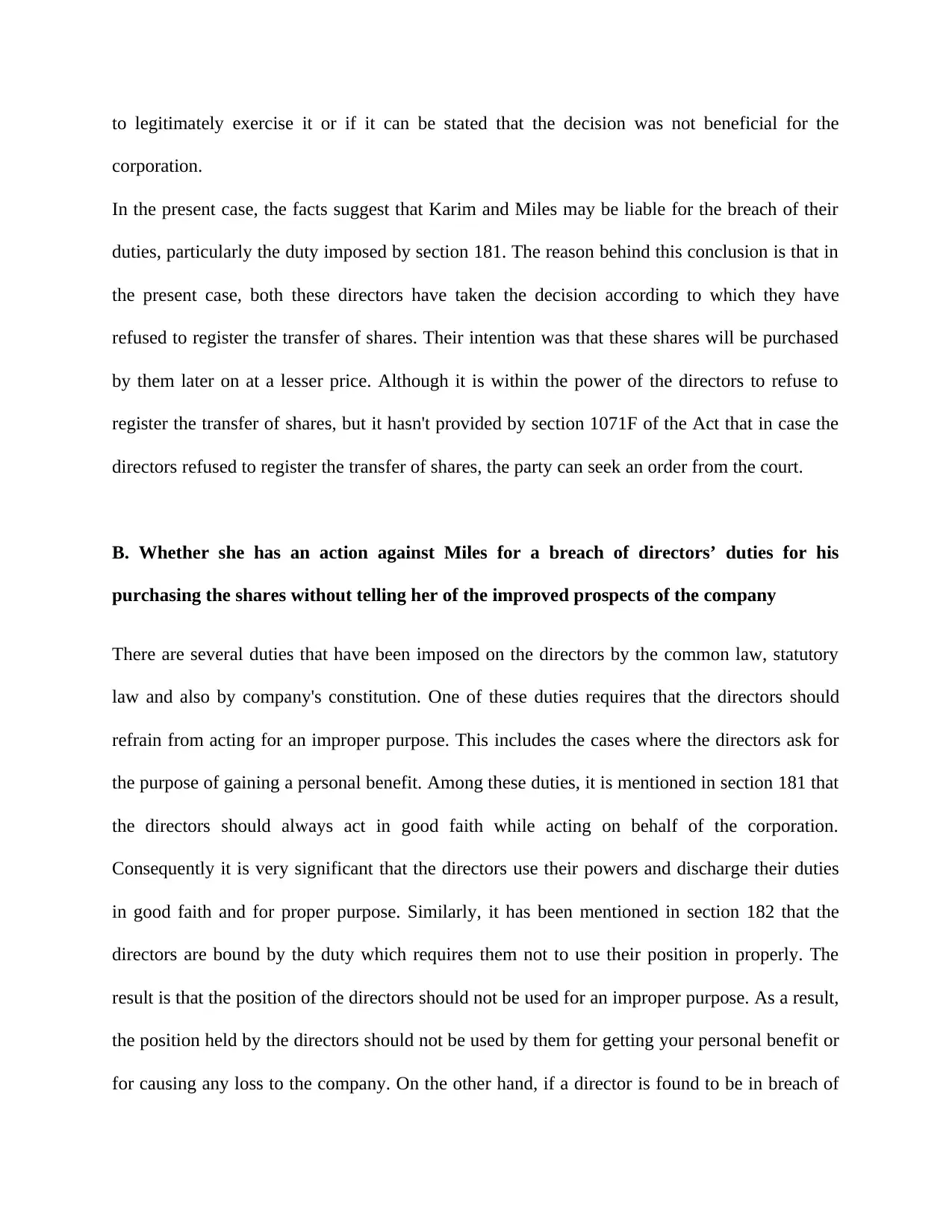
to legitimately exercise it or if it can be stated that the decision was not beneficial for the
corporation.
In the present case, the facts suggest that Karim and Miles may be liable for the breach of their
duties, particularly the duty imposed by section 181. The reason behind this conclusion is that in
the present case, both these directors have taken the decision according to which they have
refused to register the transfer of shares. Their intention was that these shares will be purchased
by them later on at a lesser price. Although it is within the power of the directors to refuse to
register the transfer of shares, but it hasn't provided by section 1071F of the Act that in case the
directors refused to register the transfer of shares, the party can seek an order from the court.
B. Whether she has an action against Miles for a breach of directors’ duties for his
purchasing the shares without telling her of the improved prospects of the company
There are several duties that have been imposed on the directors by the common law, statutory
law and also by company's constitution. One of these duties requires that the directors should
refrain from acting for an improper purpose. This includes the cases where the directors ask for
the purpose of gaining a personal benefit. Among these duties, it is mentioned in section 181 that
the directors should always act in good faith while acting on behalf of the corporation.
Consequently it is very significant that the directors use their powers and discharge their duties
in good faith and for proper purpose. Similarly, it has been mentioned in section 182 that the
directors are bound by the duty which requires them not to use their position in properly. The
result is that the position of the directors should not be used for an improper purpose. As a result,
the position held by the directors should not be used by them for getting your personal benefit or
for causing any loss to the company. On the other hand, if a director is found to be in breach of
corporation.
In the present case, the facts suggest that Karim and Miles may be liable for the breach of their
duties, particularly the duty imposed by section 181. The reason behind this conclusion is that in
the present case, both these directors have taken the decision according to which they have
refused to register the transfer of shares. Their intention was that these shares will be purchased
by them later on at a lesser price. Although it is within the power of the directors to refuse to
register the transfer of shares, but it hasn't provided by section 1071F of the Act that in case the
directors refused to register the transfer of shares, the party can seek an order from the court.
B. Whether she has an action against Miles for a breach of directors’ duties for his
purchasing the shares without telling her of the improved prospects of the company
There are several duties that have been imposed on the directors by the common law, statutory
law and also by company's constitution. One of these duties requires that the directors should
refrain from acting for an improper purpose. This includes the cases where the directors ask for
the purpose of gaining a personal benefit. Among these duties, it is mentioned in section 181 that
the directors should always act in good faith while acting on behalf of the corporation.
Consequently it is very significant that the directors use their powers and discharge their duties
in good faith and for proper purpose. Similarly, it has been mentioned in section 182 that the
directors are bound by the duty which requires them not to use their position in properly. The
result is that the position of the directors should not be used for an improper purpose. As a result,
the position held by the directors should not be used by them for getting your personal benefit or
for causing any loss to the company. On the other hand, if a director is found to be in breach of
⊘ This is a preview!⊘
Do you want full access?
Subscribe today to unlock all pages.

Trusted by 1+ million students worldwide
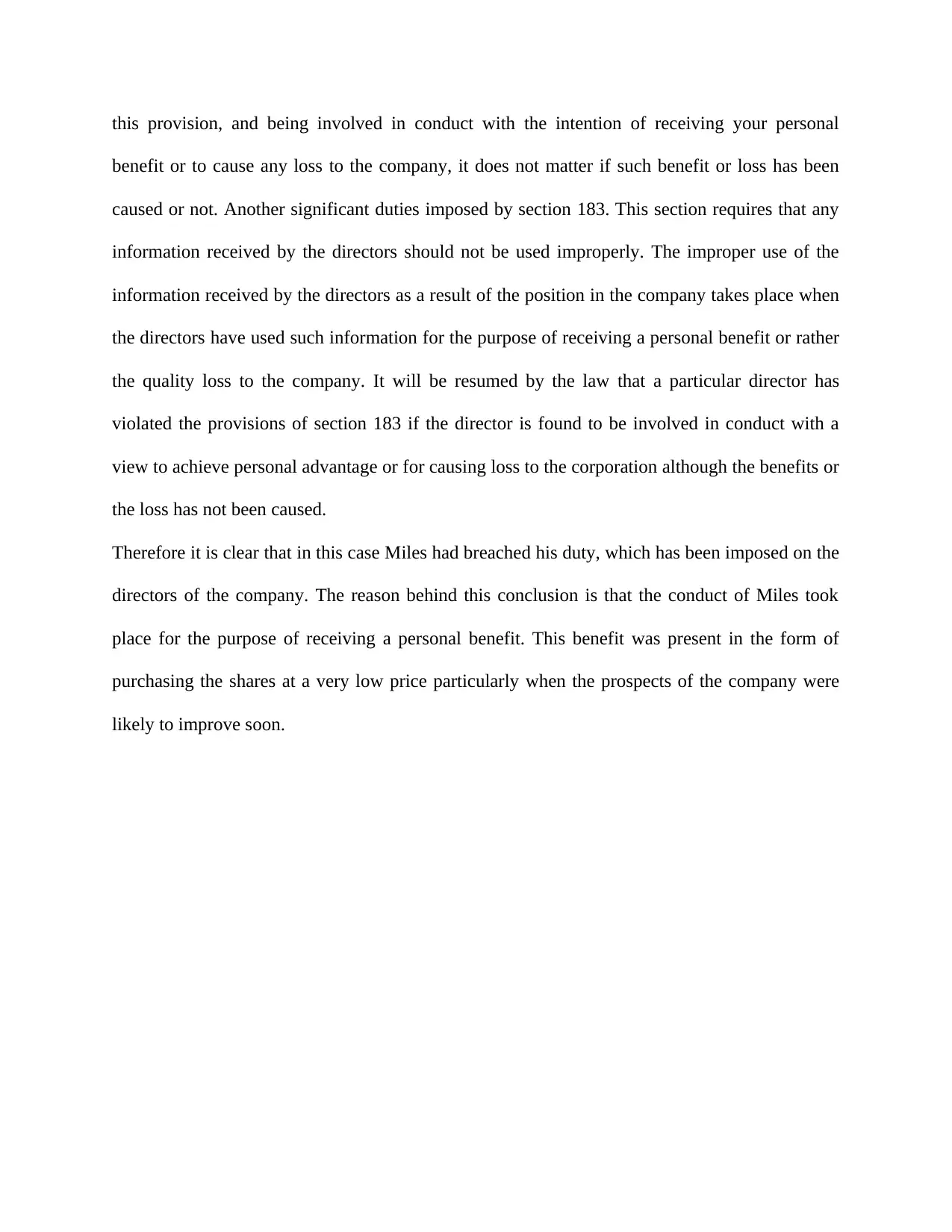
this provision, and being involved in conduct with the intention of receiving your personal
benefit or to cause any loss to the company, it does not matter if such benefit or loss has been
caused or not. Another significant duties imposed by section 183. This section requires that any
information received by the directors should not be used improperly. The improper use of the
information received by the directors as a result of the position in the company takes place when
the directors have used such information for the purpose of receiving a personal benefit or rather
the quality loss to the company. It will be resumed by the law that a particular director has
violated the provisions of section 183 if the director is found to be involved in conduct with a
view to achieve personal advantage or for causing loss to the corporation although the benefits or
the loss has not been caused.
Therefore it is clear that in this case Miles had breached his duty, which has been imposed on the
directors of the company. The reason behind this conclusion is that the conduct of Miles took
place for the purpose of receiving a personal benefit. This benefit was present in the form of
purchasing the shares at a very low price particularly when the prospects of the company were
likely to improve soon.
benefit or to cause any loss to the company, it does not matter if such benefit or loss has been
caused or not. Another significant duties imposed by section 183. This section requires that any
information received by the directors should not be used improperly. The improper use of the
information received by the directors as a result of the position in the company takes place when
the directors have used such information for the purpose of receiving a personal benefit or rather
the quality loss to the company. It will be resumed by the law that a particular director has
violated the provisions of section 183 if the director is found to be involved in conduct with a
view to achieve personal advantage or for causing loss to the corporation although the benefits or
the loss has not been caused.
Therefore it is clear that in this case Miles had breached his duty, which has been imposed on the
directors of the company. The reason behind this conclusion is that the conduct of Miles took
place for the purpose of receiving a personal benefit. This benefit was present in the form of
purchasing the shares at a very low price particularly when the prospects of the company were
likely to improve soon.
Paraphrase This Document
Need a fresh take? Get an instant paraphrase of this document with our AI Paraphraser
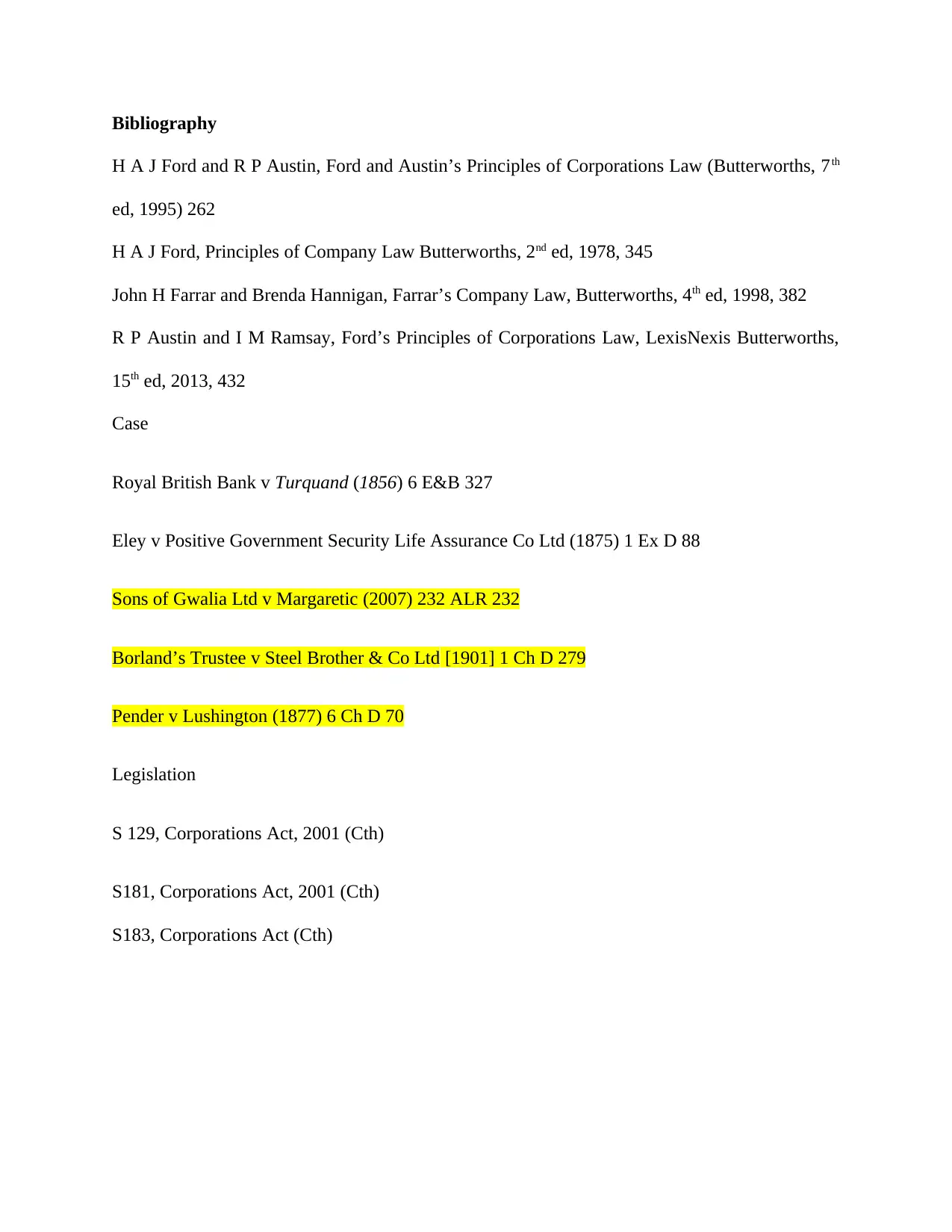
Bibliography
H A J Ford and R P Austin, Ford and Austin’s Principles of Corporations Law (Butterworths, 7th
ed, 1995) 262
H A J Ford, Principles of Company Law Butterworths, 2nd ed, 1978, 345
John H Farrar and Brenda Hannigan, Farrar’s Company Law, Butterworths, 4th ed, 1998, 382
R P Austin and I M Ramsay, Ford’s Principles of Corporations Law, LexisNexis Butterworths,
15th ed, 2013, 432
Case
Royal British Bank v Turquand (1856) 6 E&B 327
Eley v Positive Government Security Life Assurance Co Ltd (1875) 1 Ex D 88
Sons of Gwalia Ltd v Margaretic (2007) 232 ALR 232
Borland’s Trustee v Steel Brother & Co Ltd [1901] 1 Ch D 279
Pender v Lushington (1877) 6 Ch D 70
Legislation
S 129, Corporations Act, 2001 (Cth)
S181, Corporations Act, 2001 (Cth)
S183, Corporations Act (Cth)
H A J Ford and R P Austin, Ford and Austin’s Principles of Corporations Law (Butterworths, 7th
ed, 1995) 262
H A J Ford, Principles of Company Law Butterworths, 2nd ed, 1978, 345
John H Farrar and Brenda Hannigan, Farrar’s Company Law, Butterworths, 4th ed, 1998, 382
R P Austin and I M Ramsay, Ford’s Principles of Corporations Law, LexisNexis Butterworths,
15th ed, 2013, 432
Case
Royal British Bank v Turquand (1856) 6 E&B 327
Eley v Positive Government Security Life Assurance Co Ltd (1875) 1 Ex D 88
Sons of Gwalia Ltd v Margaretic (2007) 232 ALR 232
Borland’s Trustee v Steel Brother & Co Ltd [1901] 1 Ch D 279
Pender v Lushington (1877) 6 Ch D 70
Legislation
S 129, Corporations Act, 2001 (Cth)
S181, Corporations Act, 2001 (Cth)
S183, Corporations Act (Cth)
1 out of 8
Related Documents
Your All-in-One AI-Powered Toolkit for Academic Success.
+13062052269
info@desklib.com
Available 24*7 on WhatsApp / Email
![[object Object]](/_next/static/media/star-bottom.7253800d.svg)
Unlock your academic potential
Copyright © 2020–2026 A2Z Services. All Rights Reserved. Developed and managed by ZUCOL.





